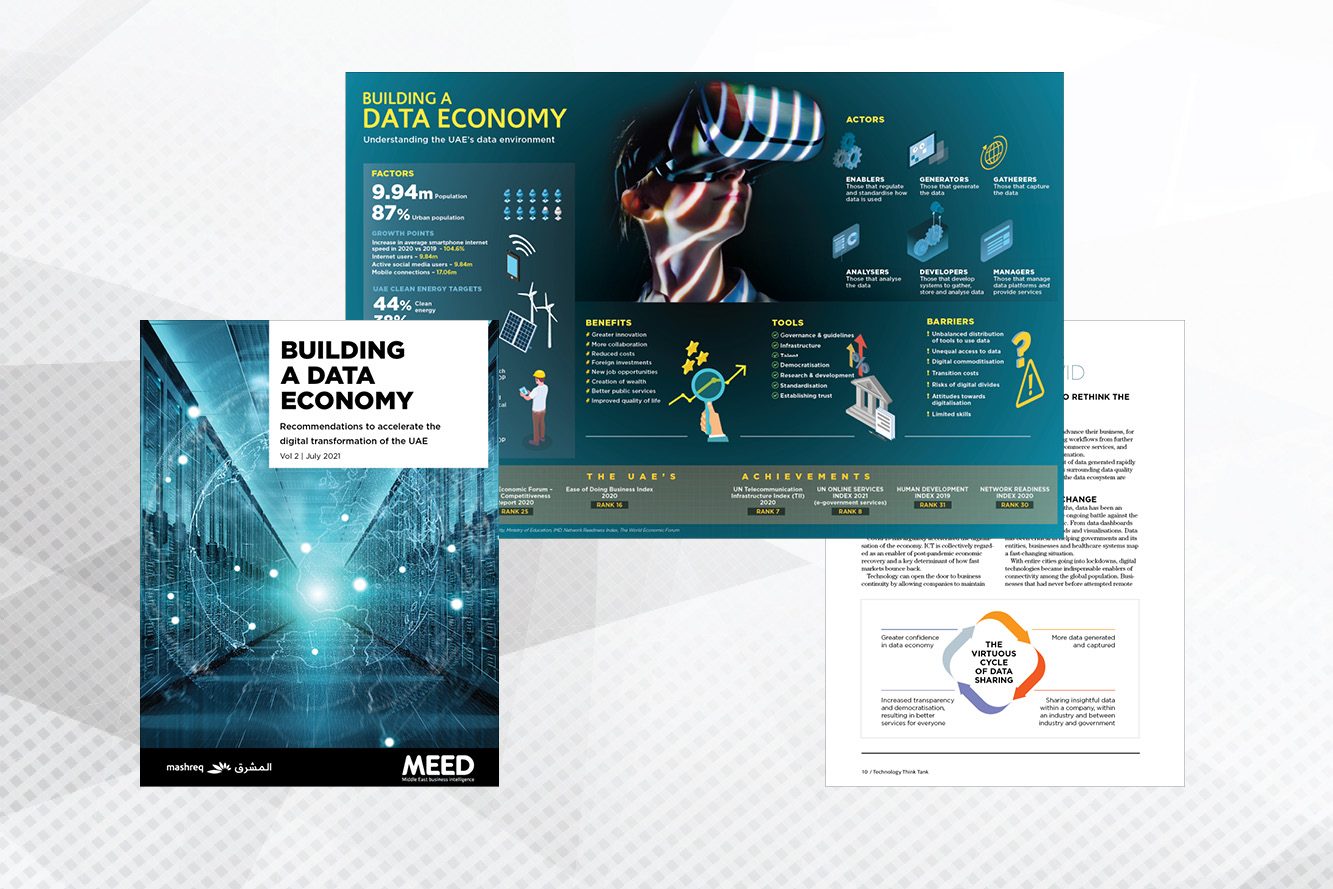Building a secure and agile data economy in the UAE

The second UAE Technology Think Tank gathered insights from industry experts on actions to accelerate digital transformation in the UAE
Download your copy of the white paper here
A data industry think tank has called for a UAE national programme to develop key skills needed to help the country achieve its ambitions of becoming one of world’s leading economies by 2030
The action is one of 10 recommendations contained in an industry white paper entitled ‘Building a Data Economy’ published by MEED and UAE-headquartered Mashreq Bank as part of its second UAE Technology Think Tank.
The white paper examined the best ways for the UAE to achieve its data economy ambitions – a key aspect of the country’s ambition to accelerate digital transformation, build its knowledge economy and become a global tech hub.
Significantly, the paper finds that as data becomes more crucial to spur innovation, and the quantity of data available increases as more smart devices come online within the ecosystem, businesses as well as the government face numerous challenges surrounding data quality and vulnerabilities in the overall digital ecosystem.
Explore findings from the first UAE Technology Think Tank
As day-to-day business becomes increasingly digital, one of the key challenges for firms is finding skilled workers that can succeed in the data economy. This issue is particularly prevalent amongst small and medium-sized enterprises (SMEs), who lack the capital resources to upskill or reskill. There also are rising concerns around data privacy and cybersecurity.
“Transformative change was already underway in the UAE’s journey before the onset of the Covid-19 pandemic, with milestones ranging from the launch of data centres by the likes of Microsoft, AWS and Oracle to commercial scale rollout of 5G networks and blockchain-enabled public services,” says Hind Eisa Salim, executive vice-president and head of services and manufacturing at Mashreq Bank.
“These investments in digital capabilities paid huge dividends amid the pandemic, when the UAE’s digital prowess was tested like never before. ICT has proven itself to be a key enabler of post-pandemic economic recovery and a key determinant of how fast markets bounce back,” she adds.
The building blocks
The recommendations identified by the think tank centre around the various stages of a “virtuous cycle” of data sharing, including: greater confidence in data economy, more data generated and captured, increased transparency and democratisation, and sharing insightful data within a company and between industries and government.
The key areas for improvement discussed in the paper include:
- Governance and guidelines: As connectivity grows, so do the issues around security and transparency. Agile governance needs to underpin all aspects of the data economy, to make sure the most effective guidelines and standards are in place. The aim of such regulations should be to ensure data availability for all, maintain optimal data quality and safeguard the rights and privacy involved in the ecosystem.
- Building a data environment: To effectively and safely gather and utilise consumer data, the UAE needs to construct a capable data environment. To make this a reality, the country should aim to create optimal conditions to encourage investments in data infrastructure, not just in the physical sense, but also in terms of ease of conducting business.
- Security and privacy: Everyday, enormous quantities of data linking to a user’s tastes, activities, location and decisions are being captured by a plethora of entities, sometimes even without the permission of users. At the same time, technology platforms are competing against one another to harvest, refine and analyse data to develop actionable insights that can be sold to other firms for targeted reach. This raises concerns surrounding the security of those that host the data and the privacy of those that provide this information.
- Democratisation and value: One of the biggest challenges in digital transformation is overcoming unequal access to data, within a group of individuals, an organization or between nations. It is important to build a culture of trust, where the purpose and ownership of data is clearly defined beyond fine print at the bottom of a website.


